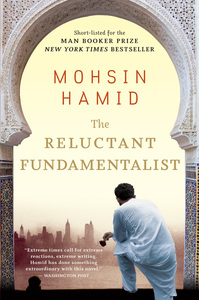Take a photo of a barcode or cover
"Excuse me, sir, but may I be of assistance?"
A slick, but inventive post-9/11 novel that is presented in a simple language/style, yet is nuanced and reads like a white knuckle-thriller.
A slick, but inventive post-9/11 novel that is presented in a simple language/style, yet is nuanced and reads like a white knuckle-thriller.
This story is memorizing and unique. The way it is written with the main character carrying on a dialogue with one person the entire book is interesting. And now, I need some answers about the ending!
The four stars is for the clever way it is written not necessarily the actual story.
The four stars is for the clever way it is written not necessarily the actual story.
challenging
dark
sad
tense
fast-paced
Plot or Character Driven:
Character
Strong character development:
Complicated
Loveable characters:
Complicated
Diverse cast of characters:
Yes
A beautifully written book with exquisite prose. It is written in the first person narrative, which is quite unusual, and draws you in.
It is an unusual story that is immediately compelling, and whilst some people won't like the ending, i did.
It is an unusual story that is immediately compelling, and whilst some people won't like the ending, i did.
challenging
dark
emotional
sad
fast-paced
Plot or Character Driven:
A mix
Strong character development:
Complicated
Loveable characters:
Complicated
Very interesting book. The story is compelling, making for a fast read. The perspective of the main character is insightful as to what it might be like to be non-white in this country in an era of fear of terrorism. The end of the book is open-ended, making for some good fuel for contemplation.
Told as a dialogic monologue by Changez, the reader spends an afternoon with the main character and an unknown and unnamed American, as they dine in a cafe in Lahore. Changez gives a brief, and at times dark, account of his life in America leading up to this point in time, which tackles the aftermath of being a Pakistani living in post 9/11 America. The wrestling of his loyalties and feelings towards America are complex, and it is refreshing to read a novel that does not simply create a dichotomy between West and East, Muslim or Christian, white or not white, without exploring the inevitable nuances that factor in the perception of identity.
challenging
mysterious
medium-paced
Plot or Character Driven:
A mix
Strong character development:
No
Loveable characters:
Complicated
Diverse cast of characters:
Yes
Flaws of characters a main focus:
Complicated
emotional
informative
inspiring
sad
tense
fast-paced
Plot or Character Driven:
Character
Strong character development:
Complicated
Loveable characters:
Yes
Diverse cast of characters:
Yes
Flaws of characters a main focus:
Yes
eye opener
Well written novel that shows reactions to 9/11 from another point of view.



